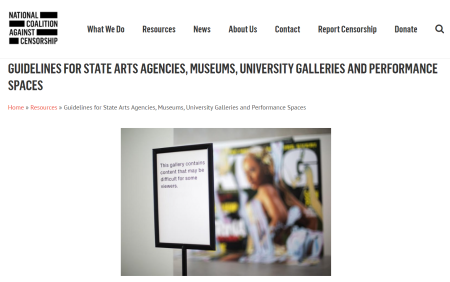National Coalition Against Censorship - Guidelines for State Arts Agencies, Museums, University Galleries and Performance Spaces

“NCAC encourages arts institutions to develop written selection policies that will guide them in showing or sponsoring art that may spark controversy in a particular community. These policies should contain procedures for responding to challenges initiated by the board, administrators, organizations and individuals in the community.
In the wake of more than a decade of attacks on arts funding institutions, museums, alternative art spaces and individual artists, it has become almost impossible to make a curatorial or funding choice without seriously considering how committed to critical and challenging work an organization can afford to be. Concessions to community standards can become compromises in favor of highly vocal and well-organized groups always ready to attack anything that offends them. Self-censorship might become preferable to threats of lost funding and time-consuming media campaigns to defend controversial art.
How can we make arts organizations less vulnerable to attacks on their choices of material to be exhibited, funded, or staged? How can we reduce the chilling effect of local political considerations?
In our experience of defending free expression against censorship, we have found that the task is made easier when there exists a clear process to be followed whenever somebody decides to challenge a work. Our findings have been confirmed by public policy research, which has found that art controversies erupt into public scandal much more frequently in cases where regular procedure is not followed.
As the existence of a formalized selection procedure is so important in defending decisions, response policies work best when backed by a selection policy. Such policies exist in schools and in public libraries, but are often missing from arts institutions. While we respect the individual choice of an organization in deciding whether or not to adopt written procedures, we believe that by specifying the criteria for selection or sponsorship of artwork, art institutions demonstrate to the community their high professionalism as well as their responsibility to a set of clearly stated criteria. Written procedures alleviate concerns that the decisions of arts institutions are arbitrary and make it harder for funding bodies to try to take money away from a work or artist they dislike. A selection policy that takes a firm position on First Amendment rights can be extremely valuable in defending a work in a fashion that is community-friendly and also manages to give the arts institution sufficient autonomy to make it possible to showcase art that does not simply reiterate one dominating worldview.”
